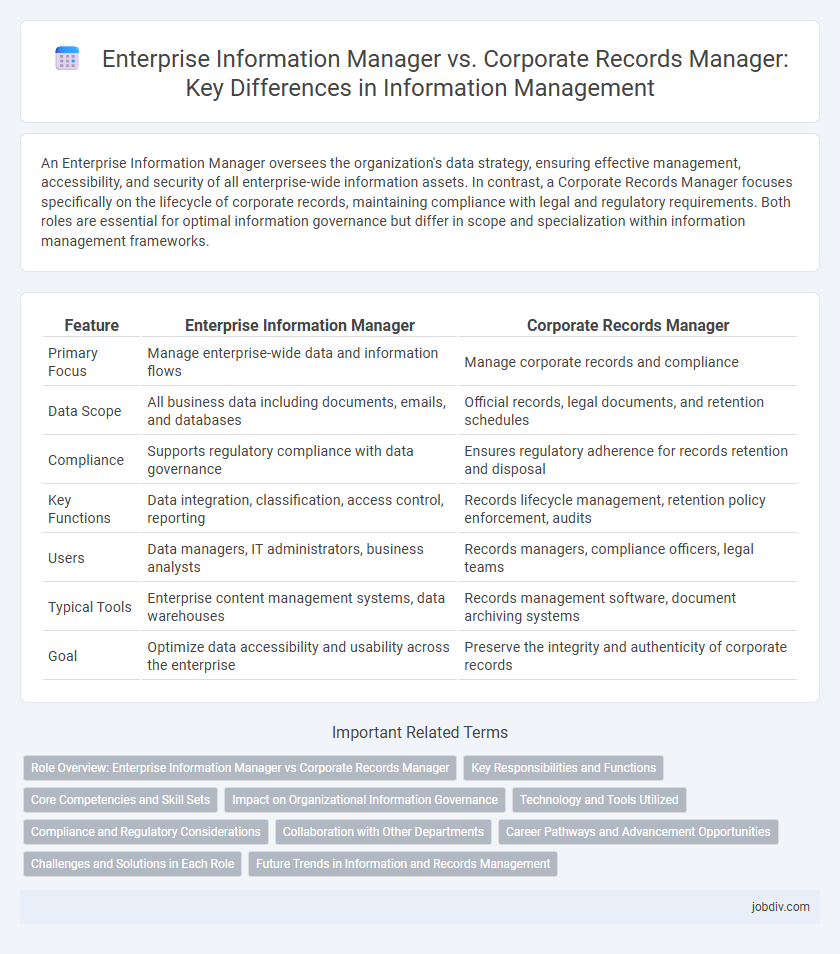An Enterprise Information Manager oversees the organization's data strategy, ensuring effective management, accessibility, and security of all enterprise-wide information assets. In contrast, a Corporate Records Manager focuses specifically on the lifecycle of corporate records, maintaining compliance with legal and regulatory requirements. Both roles are essential for optimal information governance but differ in scope and specialization within information management frameworks.
Table of Comparison
| Feature | Enterprise Information Manager | Corporate Records Manager |
|---|---|---|
| Primary Focus | Manage enterprise-wide data and information flows | Manage corporate records and compliance |
| Data Scope | All business data including documents, emails, and databases | Official records, legal documents, and retention schedules |
| Compliance | Supports regulatory compliance with data governance | Ensures regulatory adherence for records retention and disposal |
| Key Functions | Data integration, classification, access control, reporting | Records lifecycle management, retention policy enforcement, audits |
| Users | Data managers, IT administrators, business analysts | Records managers, compliance officers, legal teams |
| Typical Tools | Enterprise content management systems, data warehouses | Records management software, document archiving systems |
| Goal | Optimize data accessibility and usability across the enterprise | Preserve the integrity and authenticity of corporate records |
Role Overview: Enterprise Information Manager vs Corporate Records Manager
Enterprise Information Managers oversee the strategic management and governance of an organization's information assets, ensuring data accessibility, compliance, and integration across multiple systems. Corporate Records Managers focus on the lifecycle management of physical and digital records, emphasizing regulatory compliance, retention schedules, and secure disposal. Both roles require expertise in information governance but differ in scope, with Enterprise Information Managers addressing broader data ecosystems while Corporate Records Managers concentrate on records management processes.
Key Responsibilities and Functions
Enterprise Information Managers oversee the strategy and governance of an organization's overall information assets, ensuring data integrity, accessibility, and compliance with regulatory standards. Corporate Records Managers focus on the systematic control, preservation, and disposition of corporate records, maintaining legal and operational documentation across physical and digital formats. Both roles emphasize information management but differ in scope, with Enterprise Information Managers addressing broader data ecosystems and Corporate Records Managers specializing in records retention and archival processes.
Core Competencies and Skill Sets
Enterprise Information Managers excel in data governance, strategic information architecture, and digital transformation, leveraging skills in metadata management, data analytics, and compliance frameworks. Corporate Records Managers specialize in records lifecycle management, legal retention policies, and archival standards, with core competencies in classification systems, regulatory adherence, and audit readiness. Both roles require strong organizational skills, but Enterprise Information Managers focus on enterprise-wide data optimization while Corporate Records Managers ensure regulatory compliance and secure records preservation.
Impact on Organizational Information Governance
Enterprise Information Managers oversee the strategic alignment of information assets across the organization, enhancing data accessibility, compliance, and security frameworks. Corporate Records Managers focus on the lifecycle management of physical and digital records, ensuring regulatory adherence and risk mitigation. Together, their roles drive robust organizational information governance by integrating comprehensive data policies with effective records control.
Technology and Tools Utilized
Enterprise Information Managers leverage advanced data analytics platforms, cloud-based content management systems, and AI-driven automation tools to streamline information governance and enhance decision-making processes. Corporate Records Managers utilize specialized records management software, compliance tracking tools, and secure archiving solutions designed to maintain regulatory adherence and ensure accurate record retention. Both roles integrate emerging technologies like blockchain and metadata management to optimize information integrity and accessibility across organizational frameworks.
Compliance and Regulatory Considerations
Enterprise Information Managers oversee the strategic management of organizational data, ensuring compliance with industry regulations such as GDPR, HIPAA, and SOX through comprehensive data governance frameworks. Corporate Records Managers focus on maintaining accurate and secure documentation, emphasizing adherence to legal retention schedules and audit requirements mandated by regulatory bodies. Both roles require expertise in regulatory compliance to mitigate risks associated with data breaches, non-compliance penalties, and to support organizational accountability.
Collaboration with Other Departments
Enterprise Information Managers facilitate cross-departmental collaboration by implementing integrated information systems that ensure seamless data sharing and access control. Corporate Records Managers focus on coordinating with legal, compliance, and audit teams to maintain regulatory adherence and manage records lifecycle efficiently. Both roles enhance organizational communication, but Enterprise Information Managers emphasize technology-driven collaboration, whereas Corporate Records Managers prioritize governance and compliance alignment.
Career Pathways and Advancement Opportunities
Enterprise Information Managers focus on strategic data governance and digital asset optimization, positioning themselves for advancement into Chief Data Officer or Director of Information roles. Corporate Records Managers specialize in compliance, records retention, and risk management, leading to senior roles such as Records Management Director or Compliance Officer. Both career paths offer opportunities for growth, with Enterprise Information Managers gravitating towards technology-driven leadership and Corporate Records Managers advancing in regulatory and legal domains.
Challenges and Solutions in Each Role
Enterprise Information Managers face challenges in integrating diverse data sources and ensuring data quality across large organizations; their solutions often involve implementing advanced data governance frameworks and scalable information management systems. Corporate Records Managers encounter difficulties in maintaining compliance with regulatory requirements and managing physical and digital records lifecycle; they address these challenges through robust records retention schedules and automated archiving technologies. Both roles require continuous adaptation to evolving data privacy laws and leveraging specialized software to streamline information accessibility and security.
Future Trends in Information and Records Management
Enterprise Information Managers are increasingly leveraging artificial intelligence and machine learning to enhance data analytics and automate information governance processes. Corporate Records Managers are adopting blockchain technology to ensure the integrity and immutability of records, improving compliance and audit trails. The future of information and records management emphasizes integrated digital platforms that support real-time data access, advanced security measures, and regulatory adaptability.
Enterprise Information Manager vs Corporate Records Manager Infographic

 jobdiv.com
jobdiv.com